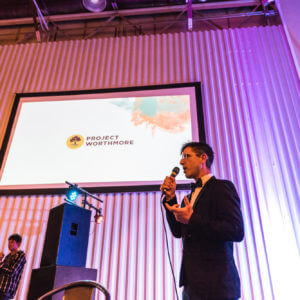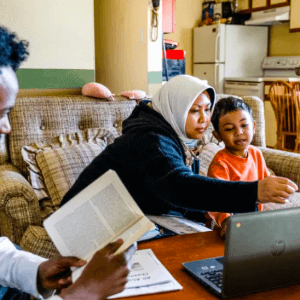In a far too ordinary room, a man sits at a long, grey table. Others sit too. Spaces of silence between them communicate a slight awkwardness, only broken by well-rehearsed greetings. “Hellos” and “How are yous?” are sung in myriad accents that color the sounds of the room like a many-cultured quilt.
Of a short and stocky stature, the man’s stubbled face appears rough and worn despite being clean-shaven; his eyes have a permanently wearied look about them, though unhidden within is the brilliance that shines forth. He’s not afraid to offer a smile and an outstretched hand. Next to him sits his wife. An azure ḥijāb veils her hair, but not her shyness or her yearning to find those precious things that are promised here in the land of the free (are those things here, now, in this room?). And clinging to the woman are two little boys whose grasp of their mother’s gown is as strong as their look of curiosity gazing at the stranger writing on the board.
Twice each week for three weeks now, this man and wife diligently attend English class. Sometimes the man bursts with excitement only for the teacher to respond with a half-smile and a slow, steady shake of the head remarking, “I’m sorry, but I don’t speak Arabic.” But these instances do little to extinguish the man’s enthusiasm, and before long he turns to the volunteer sitting next to him to continue explaining, and communicates little to be understood aside from his sheer delight.
During Monday’s class the man and his wife sit attentively, as they always do. They study the English alphabet – its forms and sounds – with the help of a volunteer. Their pointing and pantomiming is a fair substitute for the words that fail between them in their adventure to communicate. On the paper, a lower-case “f” is superimposed over a small black-and-white image of a fish. The fish’s head points downward and the tail hangs limply to the right following the curvature of the letter.
“AH fish! Fish!” the man declares gleefully as his open hand swerves in front of him, oscillating as a fish might swim through water. “Fish” is now apparently the man’s favorite English word.
The teacher approaches the table, draws his hands back over his right shoulder, then extends his arms, and flicks his wrists forward casting an imaginary fishing lure.
“Do you like to fish?”
Pointing and gesturing, the teacher repeats: “Do you like to fish?”
A flood of foreign sounds flows from the man’s mouth. He too, casts his imaginary lure into an invisible river. The teacher stands in the current. For those few moments they are submerged in the man’s fond memory.
Another student watches and says that he grilled fish for lunch. A third student at the other side of the room remarks absolutely, “I like fish!” and gestures as if to scoop a heaping fork-full into his mouth.
In the center of the room the teacher’s body speaks volumes as he casts his invisible reel one last time and points to the first student, “You can catch the fish!”
Then turning, the teacher grasps the handle of a would-be frying pan and begins to swirl and toss the fresh fish. “You can cook the fish!” he says to the second student.
Finally, to the other side of the room the teacher points, and raising handfuls of flaky fish to his mouth, says, “He’ll eat the fish!”
Laughter fills the space in the room.
Today the couple sits at the center table. They watch as, per usual, the teacher writes the date across the top of the dry-erase board, but unlike the days before, there are three others at the front of the classroom. Two translators and a third man, with vibrantly tattooed arms and a solemn look on his face, have come to aid in the day’s first learning objective. The students will not begin class with their customary greetings and introductions. They will not be given a list of vocabulary words or a worksheet. Instead, they will learn the hard way about American government. They will learn a new term: executive order.
The man with the tattoos speaks first. He begins his instruction with a brief review of the newly elected President. Within spacious pauses the meaning is communicated into Arabic and Farsi. Then he continues with a growing unease in his voice. He introduces the target language: executive order. His voice trembles, barely noticeable, and unlike the color imbued in the images wrapping around his arms, his words are darkened grey and black because he is teaching the students that for the immediate future, they must understand their friends and family members will not join them in the land of the free.
Silence overtakes the room.
The first noise to sever the void comes from the stubble-faced man.
“Will they come and take my sons from me?” The translator echoes this in English and waits, looking for a sign.
Minutes thicken with back-and-forth translation and questioning and ambiguity and uncertainty around something that a short while before seemed so much simpler: that people could come together to make space to learn. Now, all the words pile on top of the translators like so many bricks in a wall impeding all communication.
With his arms stretched forward and palms facing outward asking for quiet: “Together we are strong!” The man’s colored tattoos embellish his words as he flexes his bicep. “Tomorrow we will gather at the Capitol. We are a community that welcomes refugees! Will you all come and stand together?”
The students consider this with each other, some in Farsi, some in Arabic, some in French, and some in Burmese.
A man gestures with his arms. His favorite word is “fish,” but he doesn’t raise his fishing rod. The crook in his left elbow helps position his hand as if to support the body of a long rifle, the stock of which rests firmly in his right shoulder. Grasping the handle he takes aim: “In Syria, if the people gather like this, the next day the village is gone.”
The words pierce the space in the room before the translator even utters a sound. Sometimes words are a lost cause.
Mustering as much reassurance as possible, the teacher interjects, “Here in the USA you have rights and freedoms! This is your home! You can stand up and have a voice!”
Sometimes words are the cause itself.
Joe is a former English Language Program teacher of Project Worthmore


